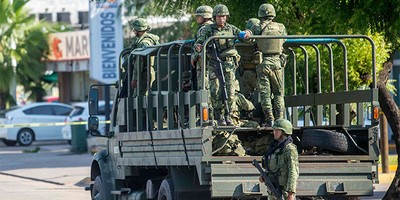The recent overthrow of Bashar al-Assad marks a significant turning point in Middle Eastern politics. Assad, along with his father, has been a brutal fixture in Syria, committing heinous crimes against humanity over the past 54 years. His regime's fall is not just a victory for the Syrian people but a major strategic blow to one of his staunchest allies: the Iranian regime.
For 45 years, the Iranian regime has relied on exporting its brand of religious extremism as a pillar of its foreign policy, with Assad’s Syria as a cornerstone of this strategy. The alliance allowed Iran to wield influence far beyond its borders, using Syria as a conduit to support various proxy groups and extend its reach throughout the region.
The fall of Assad signifies a crippling blow to Iran's strategic ambitions. Maryam Rajavi, President-elect of the National Council of Resistance of Iran (NCRI), aptly noted that this event marks the collapse of Iran’s “strategic depth.”
Iran's regime has long utilized conflict and chaos abroad to consolidate power at home. This strategy was intensified following the 2022 uprisings in Iran, as the regime sought to distract from domestic discontent and forestall further uprisings by escalating its involvement in regional conflicts. However, this strategy has increasingly become a quagmire, sucking the regime deeper into regional instability.
Syria, under Assad, served as a critical node in Iran’s network, facilitating the spread of terrorism and warfare that Tehran could not afford to conduct within its own borders. Senior Iranian officials have candidly admitted that their foreign entanglements are a diversion from potential domestic strife.
The past year has seen a series of setbacks for Iran’s regional policies. Hezbollah, a significant proxy in Lebanon, has been crippled, and Iran's influence in Lebanon and other regions has dramatically waned. The loss of many operatives in the ongoing conflicts has further weakened Iran’s grip.
Recommended
Furthermore, the geographic continuity that Syria provided for Iran to arm and support Hezbollah and other proxies has been disrupted. The role of Hezbollah as the backbone of Iran’s strategy of exporting terrorism and chaos underscores the magnitude of this loss.
The swift collapse of the Assad regime—overthrown in just 11 days after the opposition's offensive began—is a stark reminder of the inherent weakness of these apparently formidable regimes. This rapid fall sends a powerful message about the vulnerability of authoritarian regimes that rely on repression and external conflict to maintain power.
This development is not just a victory for Syria; it represents a broader shift in the region's power dynamics, exposing the fragility of authoritarian regimes that rely on external aggression to mask internal vulnerabilities. It validates the Iranian Resistance’s long-held stance that the regime in Tehran is the primary instigator of regional instability. It not only reinvigorates the regional call for democracy but also illustrates the tangible possibility of overthrowing oppressive regimes through the collective will and uprising of the people.
When it comes to Iran, however, for more than four decades, Western powers have engaged with the Iranian regime under the assumption that diplomacy and concessions could encourage reform. This approach was predicated on the hope that through constructive engagement, the theocracy would gradually transform into a more moderate and less aggressive state. Unfortunately, this policy has not only failed to curb the regime’s oppressive and belligerent behaviors but has inadvertently emboldened it. The regime has exploited this engagement as a shield, enabling it to intensify the suppression of its citizens, extend its influence across the Middle East, and escalate its activities in international terrorism.
The West's approach has often been marred by a narrative of false choice: that the only alternative to the current regime is chaos and that any form of regime change would lead to greater instability. This narrative is not only flawed but dangerously misleading, as it ignores the presence of a structured and viable alternative that has been in existence since 1981—the NCRI. This coalition, enduring and robust, with more than half of its members being women, offers a progressive 10-point plan for the future of Iran, which includes commitments to democracy, human rights, gender equality, and secular governance, and could lead Iran toward a more peaceful future, in stark contrast to the current regime’s track record of tyranny and conflict.
It is time for Western policy to evolve. Instead of perpetuating a failed strategy of engagement that has only empowered a repressive regime, the West should recognize and invest in the potential of the Iranian people and their organized opposition.
Recognizing this coalition not only aligns with the democratic values espoused by Western nations but also presents a strategic opportunity to finally address the root cause of instability in the region. By shifting focus from appeasement to empowerment, Western nations can help foster an environment where true reform is possible, and genuine peace can be achieved. This is not just about changing a regime; it is about supporting the aspirations of the Iranian people for freedom and dignity, thus contributing to regional and global stability.

























Join the conversation as a VIP Member